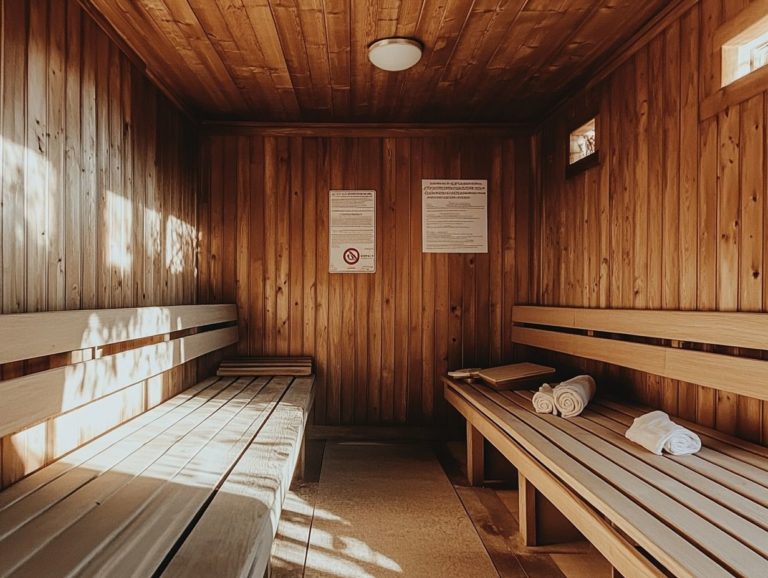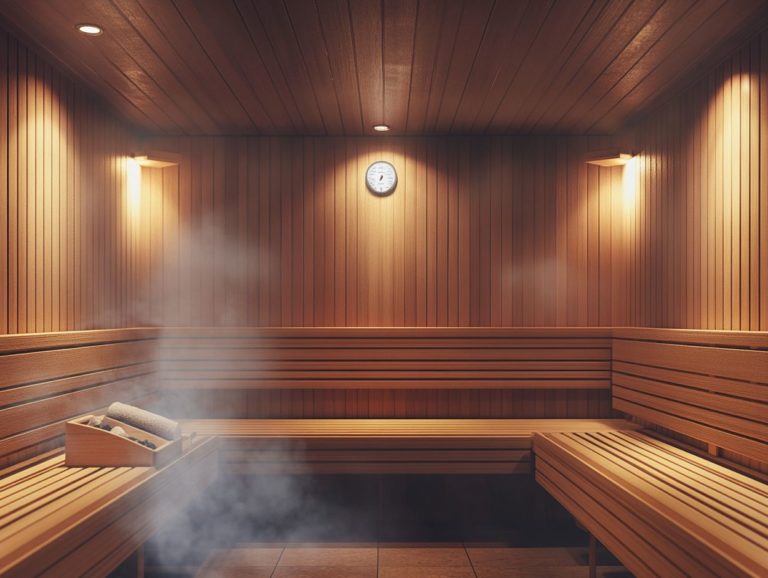Sauna Safety: Planning for the Unexpected
When you think about enjoying a sauna, the emphasis is typically on relaxation and rejuvenation. However, understanding sauna safety is essential to guarantee both a safe and enjoyable experience.
This guide will walk you through vital preparations, precautions, and safety measures to consider before you immerse yourself in the heat. It will also highlight potential risks, outline emergency protocols, and provide useful tips to keep in mind.
Prioritize safety to embrace the soothing benefits of sauna use, allowing yourself to unwind without any concerns.
Contents
- Key Takeaways:
- Understanding Sauna Safety
- Preparing for Sauna Use
- Potential Risks of Sauna Use
- Emergency Situations in the Sauna
- Sauna Safety Tips
- Frequently Asked Questions
- What should I do if I feel lightheaded or dizzy while in the sauna?
- Is it safe to use a sauna if I have existing health issues?
- What should I wear in the sauna?
- How long should I stay in the sauna to maximize health benefits?
- What can I do to prevent accidents and ensure a safe sauna experience?
- What should I do if there is an emergency during sauna use?
Key Takeaways:

- Before using a sauna, educate yourself on safety precautions and potential risks.
- Always have emergency procedures in place in case of unexpected situations.
- Implement preventive measures and follow best practices for a safe sauna experience.
Understanding Sauna Safety
Understanding sauna safety is paramount for maximizing health benefits while reducing potential risks. Whether you’re enjoying a traditional steam room or a modern infrared sauna, these spaces offer relaxation and recovery.
However, improper use can lead to dehydration, worsen medical conditions, and raise heart rates. Follow these safety tips to ensure you have a great sauna experience!
Pay attention to your body’s reactions to heat exposure. Be mindful of how sauna use might impact individuals with high blood pressure, a condition where the force of the blood against the artery walls is too high, or other medical concerns.
What to Know Before Using a Sauna
Before you step into a sauna, it s essential to grasp the health benefits and safety tips for a truly enriching experience. Familiarize yourself with how heat exposure affects your body especially regarding hydration and the potential relief from joint pain to elevate your sauna sessions.
Hydrate properly before entering the heat. Drinking plenty of water ahead of time can significantly influence how you feel during and after your sauna session, as sweating can lead to considerable fluid loss.
Understand your body s temperature regulation. Recognizing when you start to feel too warm will help you manage your sessions more effectively and comfortably.
If you have pre-existing conditions, such as cardiovascular issues or skin sensitivities, acknowledge how these factors may impact your sauna experience. This knowledge will guide you in ensuring a safe and beneficial practice.
Preparing for Sauna Use
Preparing for your sauna session is about understanding hydration. Adhering to essential safety measures will elevate your experience.
Being well-hydrated before you step into the sauna helps maintain your fluid balance and supports muscle recovery after your workouts. Taking these steps is crucial for ensuring that your time in the sauna is both enjoyable and effective.
Precautions and Safety Measures

Implementing precautions and safety measures is essential for reducing the risks associated with sauna use. Follow common safety tips such as staying well-hydrated, limiting your time in the sauna, and being mindful of any medical conditions like high blood pressure that could be affected by heat exposure.
Recognizing your personal limits is vital. Prolonged exposure to high temperatures can lead to overheating and dizziness. Start with shorter sessions and gradually increase the duration as your body adjusts. Don’t ignore your body’s signs; listen up and step out if you feel dizzy!
If you have heart conditions, respiratory issues, or if you’re pregnant, consulting a healthcare professional before indulging in sauna benefits is a wise decision. Understanding the balance between relaxation and safety, especially regarding sauna use for the elderly, ensures you enjoy a beneficial sauna experience without compromising your health.
Potential Risks of Sauna Use
While indulging in sauna sessions can provide a wealth of health benefits, it s crucial to remain mindful of the potential risks that come with improper use.
Issues like dehydration, skin irritation, and problems caused by too much heat can arise, especially if you have pre-existing health conditions.
Identifying and Managing Risks
Identifying and managing risks during your sauna sessions is essential for ensuring a safe and beneficial experience. Recognizing symptoms related to heat exposure, such as dizziness or excessive sweating, enables you to respond quickly and reduce any health risks.
Listening to your body is key. If you feel nauseous or weak, leave the sauna right away. If you’re new to sauna use or have pre-existing health issues, start with shorter sessions at lower temperatures to help your body adjust.
Staying hydrated is also crucial. It combats fluid loss from sweating. Experiment with different sauna settings; adjusting humidity levels or alternating between heat and cooler air can enhance your comfort and lower strain on your body.
Take regular breaks during longer sessions. This allows you to recover before returning to the heat.
Emergency Situations in the Sauna
In rare cases, emergencies may arise in the sauna. It’s vital to be ready with the proper protocols to ensure your safety.
Understanding how to respond to potential sauna risks, such as fainting or dehydration, can help you avoid harm and enhance your overall sauna experience.
Procedures and Protocols

Establishing clear procedures for emergencies in the sauna greatly enhances safety and comfort. Recognizing symptoms of dehydration or problems caused by too much heat allows you to implement first aid measures swiftly.
If someone faints, lower them gently to the floor to promote blood flow to the brain. Keep them cool and move them to a shaded or air-conditioned area to help them recover.
Maintain open communication. Encourage sauna-goers to share their comfort levels and any unusual feelings to prevent emergencies. During those heated sessions, remind everyone to hydrate frequently to significantly reduce risks.
Always have an easy way to call for help if needed.
Sauna Safety Tips
Sauna safety tips are essential for enjoying a beneficial experience while minimizing health risks. Stay well-hydrated, understand your limits during heat training, and know when to gracefully exit the sauna. Doing this enhances your stress relief and overall well-being.
Preventive Measures and Best Practices
Implementing preventive measures can greatly improve your sauna experience and unlock its full potential for health benefits. Prioritize hydration and drinking fluids that help keep your body balanced before and after sauna sessions to avoid dehydration.
Be mindful of your session timing. If you’re new, start with shorter durations and gradually increase to 15-20 minutes to help your body adjust. Consistency matters too; aim for sauna sessions two to three times each week to support cardiovascular health and aid muscle recovery.
Listening to your body is vital. If you feel dizzy or unwell, leave the sauna right away. Taking time to cool down and stretch afterward enhances muscle relaxation and enriches your overall experience.
These practices amplify the immediate benefits of sauna use and contribute to long-term wellness, promoting relaxation, stress relief, and improved circulation.
Frequently Asked Questions
What should I do if I feel lightheaded or dizzy while in the sauna?

If you start to feel lightheaded or dizzy while in the sauna, exit immediately. Drink some cool water and splash your face with cold water to help regulate your body temperature.
If you continue to feel unwell, seek medical attention.
Is it safe to use a sauna if I have existing health issues?
It’s best to consult your doctor before using a sauna if you have existing health issues. Saunas can negatively affect certain conditions, like high blood pressure or heart problems.
What should I wear in the sauna?
Wear loose, comfortable clothing in the sauna. Many people choose a bathing suit or towel to cover their body.
Avoid heavy materials and jewelry that can become hot and uncomfortable.
How long should I stay in the sauna to maximize health benefits?
Enjoy a rejuvenating session lasting 10-15 minutes for optimal health benefits! However, this can vary depending on your heat tolerance.
Listen to your body and exit if you feel uncomfortable or lightheaded.
What can I do to prevent accidents and ensure a safe sauna experience?
- Follow all safety guidelines and rules.
- Avoid bringing electronics or glass into the sauna.
- Don t consume alcohol.
- Always have a buddy or staff member present.
- Stay hydrated to enjoy your sauna experience fully!
- Use caution when entering and exiting the sauna.
What should I do if there is an emergency during sauna use?
If there is an emergency in the sauna, remain calm and notify staff immediately. If someone is injured or unresponsive, call for medical help and follow instructions from staff or emergency responders.
Have a first aid kit readily available in case of minor injuries.
Enjoy your sauna experience safely and make the most of your relaxation time!






